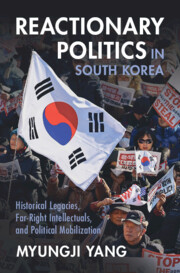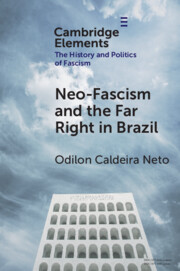Refine search
Actions for selected content:
51 results
Left-Wing Governments and Far-Right Success
-
- Journal:
- British Journal of Political Science / Volume 56 / 2026
- Published online by Cambridge University Press:
- 22 January 2026, e5
-
- Article
-
- You have access
- Open access
- HTML
- Export citation
3 - The Financing of the Radical Right – And Why Countering Isn’t Working
-
- Book:
- Terror Disrupted
- Published online:
- 18 December 2025
- Print publication:
- 22 January 2026, pp 27-41
-
- Chapter
- Export citation
Far‐right protest mobilisation in Europe: Grievances, opportunities and resources
-
- Journal:
- European Journal of Political Research / Volume 61 / Issue 4 / November 2022
- Published online by Cambridge University Press:
- 02 January 2026, pp. 1019-1041
-
- Article
-
- You have access
- Open access
- HTML
- Export citation
Neoliberalism, the Left and the Rise of the Far Right: On the Political and Ideological Implications of Capitalism's Subordination of Democracy
-
- Journal:
- Democratic Theory / Volume 7 / Issue 1 / June 2020
- Published online by Cambridge University Press:
- 01 January 2026, pp. 48-72
-
- Article
- Export citation
Does unemployment matter? Economic insecurity, labour market policies and the far-right vote in Europe
-
- Journal:
- European Political Science / Volume 18 / Issue 3 / September 2019
- Published online by Cambridge University Press:
- 01 January 2026, pp. 421-438
-
- Article
- Export citation
Conclusion
-
- Book:
- Reactionary Politics in South Korea
- Published online:
- 17 December 2025
- Print publication:
- 18 December 2025, pp 204-218
-
- Chapter
- Export citation
Introduction
-
- Book:
- Reactionary Politics in South Korea
- Published online:
- 17 December 2025
- Print publication:
- 18 December 2025, pp 1-27
-
- Chapter
- Export citation
1 - The Historical Roots of Political Topography
-
- Book:
- Reactionary Politics in South Korea
- Published online:
- 17 December 2025
- Print publication:
- 18 December 2025, pp 28-56
-
- Chapter
- Export citation

Reactionary Politics in South Korea
- Historical Legacies, Far-Right Intellectuals, and Political Mobilization
-
- Published online:
- 17 December 2025
- Print publication:
- 18 December 2025
Brokering Right-to-Life: Poland and the Transnational Entanglements of Catholic Pro-Life Activism, from Santiago to Washington to Gdańsk, 1970s–1990s
-
- Journal:
- Comparative Studies in Society and History / Volume 68 / Issue 1 / January 2026
- Published online by Cambridge University Press:
- 09 October 2025, pp. 86-113
-
- Article
-
- You have access
- Open access
- HTML
- Export citation
Far-right agenda setting: How the far right influences the political mainstream
-
- Journal:
- European Journal of Political Research / Volume 65 / Issue 1 / February 2026
- Published online by Cambridge University Press:
- 30 September 2025, pp. 101-123
-
- Article
-
- You have access
- Open access
- HTML
- Export citation
Pragmatic rather than principled – organisational bans in democracies
-
- Journal:
- European Journal of Political Research ,
- Published online by Cambridge University Press:
- 30 September 2025, pp. 1-30
-
- Article
-
- You have access
- Open access
- HTML
- Export citation
Tilting at Windmills Opportunistically: The Case of Georgian Far Right
-
- Journal:
- Nationalities Papers , FirstView
- Published online by Cambridge University Press:
- 04 August 2025, pp. 1-24
-
- Article
-
- You have access
- Open access
- HTML
- Export citation
Researching and Understanding Far-Right Politics in Times of Mainstreaming
-
- Journal:
- Journal of Race, Ethnicity and Politics / Volume 10 / Issue 3 / November 2025
- Published online by Cambridge University Press:
- 13 May 2025, pp. 814-837
-
- Article
-
- You have access
- Open access
- HTML
- Export citation
Discounting extreme positions: party normalization and support for the far right
-
- Journal:
- Political Science Research and Methods , First View
- Published online by Cambridge University Press:
- 16 April 2025, pp. 1-9
-
- Article
-
- You have access
- Open access
- HTML
- Export citation

Neo-Fascism and the Far Right in Brazil
-
- Published online:
- 15 March 2025
- Print publication:
- 20 March 2025
-
- Element
- Export citation
Red meets brown: investigating the antiliberal political convergence of Italy’s extremes
-
- Journal:
- Modern Italy / Volume 31 / Issue 1 / February 2026
- Published online by Cambridge University Press:
- 14 February 2025, pp. 119-135
- Print publication:
- February 2026
-
- Article
-
- You have access
- Open access
- HTML
- Export citation
The role of right-wing enjoyment in the normalisation of the far right
-
- Journal:
- Review of International Studies / Volume 51 / Issue 3 / May 2025
- Published online by Cambridge University Press:
- 23 January 2025, pp. 449-471
- Print publication:
- May 2025
-
- Article
-
- You have access
- Open access
- HTML
- Export citation
Conspiracy theory, anti-globalism, and the Freedom Convoy: The Great Reset and conspiracist delegitimation
-
- Journal:
- Review of International Studies , First View
- Published online by Cambridge University Press:
- 13 January 2025, pp. 1-26
-
- Article
-
- You have access
- Open access
- HTML
- Export citation
“The Anti-Woke Academy”: Dutch Far-Right Politics of Knowledge About Gender
-
- Journal:
- Politics & Gender / Volume 21 / Issue 2 / June 2025
- Published online by Cambridge University Press:
- 13 December 2024, pp. 195-219
-
- Article
-
- You have access
- Open access
- HTML
- Export citation
